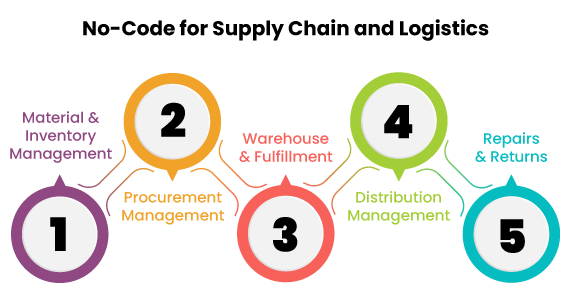
In this article, we discuss how you can benefit from the disruption in the supply chain and logistics industry by adopting no-code and automation for your business.
At a time when all industries are facing a period of massive change and disruption, supply chain and logistics businesses are challenged with the influx of innovative and digital-first systems that are going to revolutionize their industry. These systems have the power to bring down costs, expand market share and offer immense end-to-end value.
Needless to say, supply chain and logistics companies need to adopt pathbreaking digital practices as soon as possible, lest they risk wasting precious resources and lag behind the digital-ready competition. An obsolete supply chain running on traditional and redundant systems that don’t interact with each other hinders source and finished goods inventory control, visibility, and on-time deliveries to the stakeholders.
Digital process automation is the best way to go ahead in this regard, as it creates the foundation for the smarter supply chain management. More and more companies are adopting automation to cut down on friction and costs, deliver on customer and stakeholder expectations. In fact, the Delloite Industry Survey stated that 62% of organizations claimed that supply chains would be their highest priority for future digital investments. And why not? Supply chain and logistics departments in business are becoming more complex and global with each passing day, being the lifeline of any industrial process.
The Delloite Industry Survey stated that 62% of organizations claimed that supply chains would be their highest priority for future digital investments.
The increasing demands of the industry have only been given a major push due to the pandemic, leading to unique challenges that can only be solved through the power of digital transformation. Automation of supply chain management system seems a no-brainer in this sense. Even though it may sound like a complicated mission to undertake, no-code is here to squash all your concerns!
Current Problems Of Traditional Supply Chain And Logistics
Traditional supply chain and logistics systems have long been essential components of the global economy, but they face several challenges and issues in today’s rapidly evolving business landscape. Some of the current problems of traditional supply chain and logistics include:
- Limited Visibility: Traditional supply chains often lack real-time visibility into the movement of goods, leading to inefficiencies, delays, and difficulties in responding to disruptions.
- Inefficiency and Errors: Many supply chain processes are manual and paper-based, resulting in inefficiencies and errors, which can be time-consuming and costly.
- Inventory Management Issues: Accurate inventory management is essential for cost reduction and ensuring product availability. Traditional systems may struggle to provide up-to-date and accurate inventory data.
- Inadequate Demand Forecasting: Accurate demand forecasting is challenging, and errors can lead to overstock or stockouts. Traditional methods often do not leverage advanced analytics and AI for improved forecasting.
- High Operating Costs: Traditional supply chains often involve multiple intermediaries, leading to higher operating costs associated with transportation, warehousing, and distribution.
Transforming Logistics with Low-Code and No-Code Solutions
No-code platforms offer a promising solution to address many of the challenges faced by traditional supply chain and logistics systems. These platforms empower users with little to no coding expertise to create and customize software applications, which can streamline operations and enhance efficiency in the supply chain. No-code solutions can improve visibility by enabling the rapid development of real-time tracking and monitoring tools.
They also help eliminate inefficiencies and errors by automating manual processes and creating user-friendly interfaces that reduce the chances of mistakes. Additionally, no-code platforms can be used to build applications for better inventory management, demand forecasting, and cost optimization, all without the need for extensive coding. The flexibility and agility offered by no-code platforms make it easier to adapt to changing demands and integrate emerging technologies, ultimately reducing operating costs. By leveraging these platforms, the supply chain and logistics industry can improve its responsiveness, transparency, and overall efficiency, addressing many of the problems it currently faces in today’s dynamic business environment.
Watch Webinar: How to build a Supplier Onboarding app in under an hour with No-Code
No-Code Solutions for Supply Chain and Logistics
No-code is the perfect tool to embrace automation, as it gives the power to create internal applications and automated workflows without writing a single line of code. These workflows are equipped to handle the increasing demands of delivery channels, the challenges of a global supply chain, and the increasing expectations of various stakeholders. Let’s look at how no-code can transform the way supply chain and logistics companies carry out their processes.

1. Material and Inventory Management in Supply Chain
A functional inventory is established as a core component of any supply chain and is one of the most important criteria for a supply chain to work in tandem in tandem. Even the slightest of slip-ups or shortages can have serious consequences and delays.
You can easily use no-code to build apps for planning and determining the requirements of spare parts, raw materials, and other miscellaneous items required for the production plan implementation. As you automate your inventory management, you get better visibility and control over the entire operation. This leads to enormous savings on time and resources, allowing you to streamline your processes end-to-end. You can also set up alerts and notifications to ensure that there is never a shortage.
Impact Stories: Quixy propels Jatagan to a 50% higher level of productivity!
2. Procurement Management for Supply Chain and Logistics
Needless to say, procurement is a very important aspect of supply chain management as everything, right from vendors to products to terms of negotiations, needs to be optimal. Each of these aspects can be enhanced through automation by using the purchase data to cut down on time and make better decisions.
With no-code, you can ensure that you buy the right material at the right price at the right time by streamlining your procurement processes to manage RFQ’s, negotiations, confirmations, and purchase orders. Let your procurement worries be a thing of the past, and get ahead of your competitors with the power of automation.
Also read: 5 Procurement Automation Processes to Embrace Today
3. Warehouse and Fulfillment
A warehouse management system (WMS) is an integral aspect of any supply chain and logistics company. The system should be equipped to oversee warehouse items’ movement and storage and support processes like transactions, shipping, picking, etc.
With no-code tools, you get the power to automate your warehouse and fulfillment operations to help process more orders faster. You get to combine sales, inventory, and purchase data and automate your workflows to ensure the best service for your customers. Manual errors are also fixed through no-code, as there is no scope for oversight or slip-ups once your entire process is automated.

4. Distribution Management
Distribution management is very crucial for any supply chain and logistics company as profit margins heavily depend on how fast goods can be turned over. The higher your sales, the more you earn and make your business a success. This is why having a competent distribution system in place is integral for your business to remain competitive and meet the ever-increasing demands of the industry.
No-code allows you to create a distribution system without spending an enormous amount of time and money in employing coders and developers. You can automate your distribution processes to seamlessly work with other supply chain and logistics activities, including inventory management, warehouse management, and order management without writing a single line of code. This will allow you to improve customer satisfaction, control logistics costs, and reduce order times across the entire supply chain.
Also Read: Retail Automation : Unlock Success in the Future of Shopping
5. Repairs and Returns in Supply Chain Management and Logistics
Repairs and returns are some of the biggest challenges faced by supply chain and logistics companies. However, the challenges associated can be efficiently dealt with by using an integrated asset and inventory management system that enables tracking of serialized items and generates operational reports. Automation can aid in accurate inventory valuation as well.
With the help of no-code tools you can eliminate cumbersome, time-consuming, and error-prone manual processes to reduce return costs and turnaround time related to repairs and returns. Automation will also enable you to save costs and improve customer satisfaction by integrating end-to-end repairs and returns management processes.
The benefits of no-code for supply chain management solutions and logistics are endless, and the companies that have adopted these tools have benefited enormously. From enhanced collaboration and visibility to automated document generation, we can write on and on about how your business can become future-ready through the use of no-code tools.
Also read: Game-Changing Logistics Software to Boost Your Supply Chain
No-code tools helped Cochin Port to reduce their cargo dwell time significantly. Using Quixy’s no-code tools, all CFS operations including Import, Export, and Transshipment activities were automated including integration with the Port Community System (PCS). This led to a 25% reduction in cargo dwell time and a significant improvement in process efficiency. You can read the full case study here.
Quixy helps CFS at Cochin Port reduce cargo dwell time by 25%
Benefits Of No-Code And Low-Code For Logistics & Supply Chain Management Solutions
No-code and low-code platforms offer many benefits for the supply chain management and logistics industry. These benefits can transform and modernize operations, making them more efficient, flexible, and responsive. Here are some of the key advantages:
- Rapid Application Development: Accelerates the creation of custom applications, enabling swift solutions to industry-specific challenges.
- Cost Savings: Drastically reduces development and maintenance costs compared to traditional software development.
- Enhanced Efficiency: Streamlines workflows, automates processes, and reduces errors, resulting in increased operational efficiency.
- Improved Visibility: Provides real-time tracking and monitoring tools, offering better insight into the movement of goods and enabling quick responses to disruptions.
- Flexibility and Adaptability: Allows for easy adjustments to meet changing requirements, market conditions, and regulations, making it ideal for an industry that demands adaptability.
Also Read: Why Quixy for a Custom Warehouse Management System?
Conclusion
To sum up, automating your supply chain and logistics processes through no-code will lead to increased operational efficiency, which will lead to improved stakeholder experience, elimination of manual errors, and efficient inventory management. Enhanced transparency, control, and visibility will also lead to better use of time and resources, which leads to better decision-making.
The only way to capitalize on the disruption caused is to dive into digital transformation tools like no-code headfirst and modernize your supply chain and logistics processes like never before. Quixy has enabled many clients throughout industries and verticals to solve their unique challenges and bring ideas to life at the speed of no-code.
Don’t lag behind your competitors when the adoption of automation can give you a rewarding headstart. Explore how Quixy can revolutionize your supply chain and logistics business. Get started with our platform, and experience the ease of automated processes and personalized app building.
Transforming your business is just a click away.
Frequently Asked Questions(FAQs)
Q. Why is Supply Chain Management Important?
Supply chain management is crucial because it ensures the efficient flow of goods and services from suppliers to customers. It minimizes costs, reduces lead times, and enhances customer satisfaction. Effective supply chain management also allows companies to adapt to market changes and maintain a competitive edge.
Q. What Does Supply Chain Management Involve?
Supply chain management involves planning, sourcing, producing, delivering, and managing all the processes and activities necessary to bring products or services to the end consumer. It encompasses everything from procurement and production to logistics and distribution, with the aim of optimizing these processes for efficiency and profitability.
Q. What is Global Supply Chain Management?
Global supply chain management extends traditional supply chain practices across international borders. It involves coordinating and optimizing the sourcing, production, and distribution of goods on a global scale. This often includes dealing with international regulations, currency exchange, and cultural differences while maintaining cost-effectiveness and quality.
Q. What is Strategic Sourcing in Supply Chain Management?
Strategic sourcing in supply chain management involves a systematic and long-term approach to procurement. Considering factors like supplier relationships, quality, and sustainability goes beyond cost savings. By aligning sourcing with overall business goals, companies can secure reliable and cost-effective sources of supply, enhancing competitiveness and reducing risks.
Login
Please login to comment
0 Comments
Oldest















